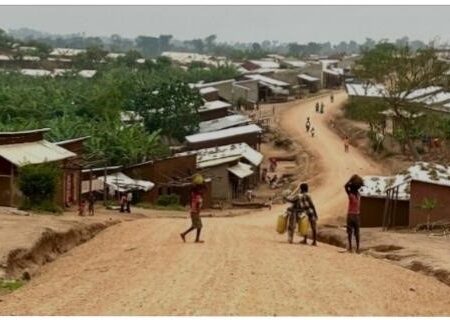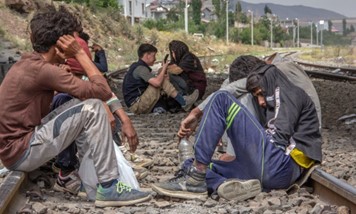Background
From time immemorial, migration has effected change in human society. It is an instrument of globalization as it fosters interaction amongst people of diverse cultural, socio-political and economic backgrounds, influences individuals and their way of life, and impacts the development of societies. The subject of migration is not restricted solely to human migration but could be movement of animals, companies, among other options. However, this paper addresses human migration.
The issue of migration is a broad phenomenon. It can be internal (interstate, intrastate), which is within a geographical scope or national boundaries, or international (external), which is across national boundaries. Likewise, migration can be undertaken voluntarily or involuntarily, and can be for a long-term or short-term purposes. While voluntary migration is informed by purposes such as work, business, leisure, education, and a search for greener pastures, among other reasons, involuntary migration is spurred by natural disasters and environmental challenges like famine, desertification, floods, earthquakes, social conflict, war, and human trafficking.[1] Individuals who migrate out of a geographical location are regarded as emigrants, the ones that migrate into a new geographical location are regarded as immigrants.
Across the globe, several occurrences have ensured that migration is a constant to human existence. The trans-Saharan trade which began before the 10th century connected sub-Saharan Africa and North Africa. It was spurred by trade and migration, and led to the expansion of settlements like Timbuktu. Also, the bubonic plague in the early 14th century spread from China across Italy and Europe via established trade routes (known as the Silk Road) and over the seas by ships. This coupled with the Hundred Years War and famine amplified migration in the period.[2]
Similarly, Europeans’ arrival to the New World (the Americas) in the late 15th century through voyages of exploration further facilitated migration as new trade patterns and routes were established, and new settlements sprang up across the Atlantic. In addition, it ushered in the long era of the transatlantic slave trade,[3] heightening the interaction among various races and leading to the birth of mixed races and the development of new social classifications.[4]
Furthermore, in the 17th century, the world witnessed a mass migration of the French Huguenots from France (due to persecution), into Europe, Africa and the American colonies. From the late 18th century, migration was accelerated by the invention of new manufacturing technologies, leading to mass production and the need for larger markets. Communications technologies such as the telegraph and transportation infrastructure such as railways shortened long distances, fostering the transmission and flow of ideas.
By the 20th century, major events such as the partitioning of India and Pakistan, which led to the migration of millions from their original abode; the events of the First and Second World war; and colonialism of nations by several powers; amongst other events, showed that migration is constant in human societies.
In the 21st century, cases of migration is yet intensified amidst globalization, societal factors, environmental factors, and personal pursuits. A major case of migration in the century is that of the stateless Rohingya people who mainly resided in Rakhine State, Myanmar. Having been victims of attacks over time,[5] in 2017, the world witnessed a mass exodus of more than half a million Rohingya people across the border to neighboring Bangladesh in search of safety and shelter.
Though there are several cases of non-Nigerians who have migrated into Nigeria, this is incomparable to the increasing number of Nigerians residing outside of their home country. This has raised concerns mainly among Nigerians home and abroad. Therefore, the purpose of this work is to discuss the rationale for voluntary migration of Nigerians from Nigeria, the underlying societal causes, and the impact of migration on individuals and the society.
Overview of Migration in Nigeria
Nigeria is a country in West Africa with a population of 212,038,975 as of August 2021.[6] Like other countries, Nigeria has experienced migration of people across and within its borders. During the colonial period of the 20th century, the country recorded massive internal migration as people moved from villages and towns into the cities. From the post-colonial period until the 1970s, movement in Nigeria mainly remained within this scope. Although Nigerians also ventured outside the country to West African countries, the United Kingdom and the United States, the majority had an ultimate goal of returning.
In the 1970s, although demands for labour grew in developed countries due to economic expansion, Nigeria also experienced an oil boom that raised the standard of living and improved the economy. As a result of this, Nigerians had minute reasons to permanently migrate from the country; therefore, most migrants traveled on temporary visas. For instance, Nigerian students and some other citizens sometimes go on vacations with temporary visas, although there were few exceptions as some travelled for educational purposes and settlement.[7] At this period, there was enough scholarships for students to venture out, acquire more skills, and willingly return to the country; likewise the value of the Nigerian Naira currency to dollar was less than 75k to 1 dollar, and almost equivalent to the British pound.[8] Owing to this, only few Nigerians valued emigration over living within the country as domestic working conditions were attractive, internationally competitive, and the environment was relatively safe. By the 1980s however, the heavy dependence on petroleum among factors like the introduction of the Structural Adjustment Programme plunged the Nigerian economy into recession. This coupled with political instability adversely effected livelihoods.[9] With various job opportunities and better living conditions outside of the Nigerian border, many Nigerians saw this offer as a life changing opportunity. From this point onwards, international migration of Nigerian citizens increased and people already outside the country changed their status from temporary to permanent residents.
In the 21st century, migration continues to be an important force in Nigeria. Although Nigerians sometimes travel abroad on short term basis for leisure, work and trading activities; however, other factors such as the state of the Nigerian socio-economic and political sphere, have heightened migration of Nigerians to other countries. Coupled with this is also the prospect of better opportunities outside the Nigerian shore.
Nigeria is a developing country that is faced with mounting systemic issues like unemployment[10], corruption, poor leadership, infrastructural decay, non-functional industries, insecurity, inflation, and a high poverty rate, among other issues. These impact the educational system, work, businesses, and overall quality of life. Despite available resources such as a growing labour force and young population, inadequate management has reduced the productivity of the Nigerian economy. These trends have exacerbated the outward flow of Nigerians, especially professionals, entrepreneurs and students, to other countries.
According to the Organization for Economic Co-operation and Development (OECD), the largest population of Nigerian migrants in OECD countries were employed in the health-care system, followed by the real estate and wholesale sectors. Likewise, a large percentage of Nigerian physicians work in the United States and the United Kingdom. The United Kingdom’s Nursing and Midwifery Council registers Nigeria as one of the major source countries for admitting nurses and midwives. Between 2002 and 2004, about 500 nurses legally emigrated. Overall, between 2001 and 2006, about 21,990 health workers had emigrated (even though some of these migrants were gainfully employed in Nigeria prior to migration). Many Nigerians also enroll in universities abroad.[11]
As of 2015, over a million Nigerians resided across various continents.
Table 1: Data of Nigerian Emigrants in 2015[12]
| Destination | Male | Female | Total |
| Asia | 24,403 | 12,789 | 37,192 |
| Europe | 209,629 | 188,848 | 398,476 |
| Australia | 3,812 | 2,570 | 6,382 |
| Other African countries | 219,777 | 155,658 | 375,435 |
| North America | 134,465 | 137,376 | 271,841 |
| South America | 1,204 | 407 | 1,611 |
| Latin America | 1,911 | 796 | 2,707 |
| Total | 595,200 | 498,055 | 1,093,644 |
The number of Nigerians living in other countries continue to increase on a daily basis; however, data on increase are more available in their country of residency. It is worthy to also note that while Nigerians reside in Europe and North America, a large number also live within sub-Saharan Africa. The case of voluntary migration in Nigeria is thus an important discourse as Nigerians continue to spread across continents of the world.
Rationale for Migration and Its Impacts
From the late 20th century, and most especially in the 21st century, socio-economic and political instability has hampered development. This is a major factor that has fostered migration from Nigeria, along with the pursuit of societal relevance and affluence. Many view migrations out of the country as an achievement and a thing of pride.
Yearly, the country produces large numbers of graduates from tertiary institutions; however, the labour market is unable to absorb this surplus labour force, contributing to a high rate of unemployment in the country. Between January 2017 and January 2021, the unemployment rate of active job seekers increased from 13.3 percent to 33.3 percent (see fig 1). Unemployment contributes to the increase in crime and insecurity in Nigeria.

Fig 1: Nigeria Unemployment Rate
In Nigeria, poverty, unemployment, population growth, inflation, the low value of currency, the lack of basic health and education, public debt, insecurity, human rights abuses, corruption, conflict and discrimination are push factors for international migration. In the same vein, the prospect of a better wage, improved living standards, safety, political freedom, reunification with family and friends, and personal development are pull factors that attract Nigerians to other countries.[13]
The large number of migrants, especially among the highly skilled, has resulted in a massive brain drain. The skills needed to contribute to Nigeria’s development go instead to the new country of residence. In the health sector for instance, with many medical practitioners venturing out of the country due to push factors like inadequate medical facilities and poor working conditions, and pull factors such as better working conditions; the development of heath sector in Nigeria is faced with a serious challenge.
Although the inflow of remittances contributes to economic development, especially the livelihood of direct recipients, this in no way can mitigate the negative impact of brain drain as an effect of migration in Nigeria, nor does it alleviate the socio-economic and political challenges being combated in Nigeria.
Furthermore, for the purpose of this paper, I engaged five Nigerian emigrants in an oral interview.[19] These emigrants shared their personal opinion and as well as what propelled the decision to migrate. Although few in number, their responses reflect the opinion of many Nigerians home and abroad.
In the opinion of the first interviewee, Olumide (who has resided in Wisconsin, USA since 2017), the main reason for migrating was to further his engineering studies and develop new technological skills since the educational system in his home country Nigeria was not so practical. On receiving a scholarship to study abroad, he left the country. He shared his experience in his current country of residence, stating that he has better practical exposure in his field, better security, a reasonable salary, and his personal skills is relevant and acknowledged in his place of work. When asked about plans to remain in the U.S, he stated his intentions to temporarily remain in the U.S for further studies and work; however, he also noted his commitment with families in his home country.[20]
In the case of the second interviewee, Seyi, he noted how he permanently migrated from Nigeria in 2018 after receiving a federal government sponsored scholarship to have his Master’s degree study in Hungary. He moved to the USA with his family in 2020 after completing his studies in Hungary. When asked what informed his decision to stay abroad, he stated that prior to relocating, he travelled out of his home country on several occasions for either leisure or work, but had no plans to reside outside Nigeria. However, he mentioned that the poor state of the country’s economy finally changed his disposition and this made him seek a greener pasture.[21]
He added that he finally left the country via the educational platform as there was no mandatory requirement for awardees to return. However, one germane thing he said was that although the purpose of such scholarships is to help people acquire new knowledge, when people get that kind of educational experience, they do not want to return to the country because they have better access to leaning materials and equipment, and more practical knowledge in their field of study. He noted that when professionals are sent for trainings, it is also best to make the country conducive as parts of the reasons people do not return is due to the state of the nation, such as economic instability and low standard of living. He raised concerns that Nigeria is constantly losing human capital while the various host countries utilize this opportunity. He mentioned that although Nigerian emigrants remit money back to the country, the issue of brain drain affects the Nigerian society as it loses more than it gains. He said that most migrants remain connected to their country and wish it will be conducive for them to return.[22] However, until then, migration is inevitable.
In an oral interview with Bobola, the third emigrant, who has lived in the United States since 2012, he mentioned leaving the country initially for his Master’s degree. He had planned to return to Nigeria, however that changed following other factors. The interviewee stated that based on the Nigerian system, his course of study in geology does not put him in a vantage position for job opportunities especially in the face of high unemployment rate. He further mentioned that job prospects in the Nigerian oil and gas sector in his opinion are fewer in comparison to the US, and that the country is more organized. Bobola also stated that besides the oil and gas sector, there are better job opportunities in the US, and unlike Nigeria where on several occasions job offers have age limits which is a big limitation, the Unites States of America is different. He further stated that there is better access to health insurance in the U.S than Nigeria, emphasizing that no one would be willing to return to a country that lacks effective health insurance. Furthermore, in his opinion, the state of the political system in Nigeria is also not encouraging, citing an example of a new petroleum bill which was just passed after being dragged for 20 years in the Senate, and how that this could have created better job opportunities earlier on.[23]
In an oral interview carried out with Enoma, a Nigerian emigrant that has resided in the US since 2017, the interviewee stated that he migrated from Nigeria after abandoning his medical career in his third year in a Nigerian university to enroll in a US Medical school. He emphasized that the education in Nigeria is not as high in standards and hands-on research activities as in US institutions. When asked to share his thoughts on how the society possibly influenced his decision to travel, he stated that Nigeria has no plan for youths, and that lack of resources has always been the enemy of imagination. Also, he noted that he has big dreams which the Nigerian environment could not nurture.
Furthermore, he stated that poor electricity and lack of proper infrastructures frustrate lots of possible productive activities in Nigeria and have resulted in high costs to businesses, the folding up of businesses, and negative consequences for livelihood and development. He supported this point, by stating that if a thriving business in the U.S is relocated to Nigeria, such business would likely run on losses. Furthermore, he shared his knowledge about moments where power outages occur during medical operations in his home town hospital. Similarly, he stated that Nigerian institutions lack maintenance culture and the Nigerian educational system is more theoretical, as there is less equipment and fewer instruments for practical training. He also observed that the state of the country a decade before was better than its current state.
Enoma further added that there are better internship and job opportunities in the US. Noting this, he raised his concerns regarding brain drain in Nigeria, pointing out that majority of the big brains are in the U.S, and that they receive greater admiration in the U.S. Finally, he mentioned that his experience in the U.S has been great and blissful as there are opportunities to prosper regardless of nationality. He summed up his point as he pointed out that when one is guaranteed of a job after graduation, better pay with a stronger currency, and a better environment, why would anyone wish to return to Nigeria?.[24]
Finally, in an interview with Bolaji, a Nigerian emigrant who has resided and worked as a nurse in the United Kingdom since 2019, she stated that relocating was initially not an option nor a priority for her. However, practicing the nursing profession outside Nigeria has better prospects. Also, owing to the influence of family members, friends and colleagues who are migrants and earn better pay and better working condition, the media which keeps providing details as regards travelling opportunities, and other societal factors, she decided to migrate. She stated that compared to her home country, she is more appreciated for practicing her profession.
When asked about her experience in her current country of residence, she pointed out that the system works. She mentioned that based on her experience so far in the United Kingdom, the country system is such that puts the workforce into consideration, as working condition is quite impressive. She also said the living conditions are better than in her home country. Furthermore, when asked her opinion about the impact of migration, the interviewee made mention of the brain drain on her home country, as it is losing the best hands. She cited an instance from her graduate class. Among six first class graduates, five have relocated while the sixth is in the process, and she notes that these numbers do not account for other graduates. The interviewee further said that the best resource any society can have is the human resource; this affects development in Nigeria. In contrast, these populations of highly skilled individuals contribute to the development of their host countries.[25]
Conclusion
The issue of migration is a universal phenomenon as every society experiences mobility of people across borders. For the Nigerian society, especially in recent times, migration is a major topic as it not only influences development but is a rising trend in the country. Although for decades, migration of citizens has existed, in recent times, it has heightened as a result of personal, internal, and external factors which all took roots from societal issues. The growing cases of insecurity, unemployment, and lack of adequate social amenities have affected livelihood and the state of the economy. For humans, it is natural to seek better living conditions when dissatisfied and Nigerians are not exempted as the country is plugged into deep systemic irregularities, visible to both its citizens and external forces. Owing to this mounting desire for an improved livelihood, the number of Nigerians found across the world has increased.
While the Nigerian populace continue to applaud positive contributions of Nigerian emigrants to their home country and their country of residence; the negative effects of migration, is also, undeniably visible in the Nigerian society, and will continue to constitute itself as a mounting challenge to development, if not addressed. To therefore find a balance between migration and development, and to make the Nigerian environment more conducive for growth and development, various societal factors that have affected systemic stability and development in the country ought to be addressed.
References
John, Wajim. Labour Migration: Causes and Patterns in Nigeria. International Journal of Research and Innovation in Social Science (IJRISS), Vol III, Issue X. October 2019. Retrieved June 20, 2021. www.rsisinternational.org.
Rohingya Refugee Crisis. https://www.unicef.org/bangladesh/en/rohingya-refugee-crisis . Retrieved September 4, 2021, 02:00 am
Nigeria Population (LIVE)- Worldometer. https://www.worldometers.info/world-population/nigeria-population/#:~:text=The%20current%20population%20of%20Nigeria,the%20latest%20United%20Nations%20dataRetrieved August 30, 2021.
Aderanti Adepoju (Revised), Network of Migration Research on Africa (NOMRA). NATIONAL MIGRATION POLICY 2015. International Organization for Migration Mission in Nigeria (IOM). Retrieved August 25, 2021, 10:20am.
https://www.nigerianstat.gov.ng/
Adejumoke Afolayan. IOM’s Research Division. Migration in Nigeria: A COUNTRY PROFILE 2009. International Organization for Migration. Retrieved June 15, 2021, 2:00pm.
O.A. Adedokun, I.V. Karzanova. Impact of Migration On the Economy of Nigeria: Recent Trends. https://www.researchgate.net/publication/334312429 Retrieved August 25, 10:14 am.
Nigerian Unemployment rate. https://tradingeconomics.com/nigeria/unemployment-rate Retrieved September 8, 2021, 12:40pm
https://www.migrationdataportal.org/themes/remittances
https://www.thecable.ng/world-bank-nigeria-responsible-for-over-40-diaspora-remittances-in-sub-saharan-africa Retrieved September 7, 2021, 4:52pm
https://tradingeconomics.com/nigeria/remittances Retrieved September 7, 2021, 4:54 pm
Oral Interviews
Interview conducted with Olumide on July 30, 2021, 01:23pm (Nigeria time)
Interview conducted with Seyi on July 30, 2021, 3:34pm (Nigeria time)
Interview conducted with Seyi on July 30, 2021, 3:34pm (Nigeria time)
Interview conducted with Bobola on July 30, 2021, 4:25pm (Nigeria time)
Interview conducted with Enoma on August 2, 2021, 8:29AM (Nigeria time)
Interview conducted with Bolaji on September 6, 2021, 12:09pm (Nigeria time)
Interview conducted with T.J Odeyemi on Sept 3, 2021, 09:42 pm (Nigeria time)
Footnotes
[1] John, Wajim. Labour Migration: Causes and Patterns in Nigeria. International Journal of Research and Innovation in Social Science (IJRISS), Vol III, Issue X. October 2019. Retrieved June 20, 2021.p116 www.rsisinternational.org.
[2] Events of the 14th century affected socio- economic and politic stability. Migration ensued as soldiers fought through the Hundred Years war; likewise, a majority moved in search of medical care, safe haven, and greener pasture. Majority also migrated from villages into cities for job opportunities as depopulation fostered the need for labour force.
[3] The transatlantic slave trade involved the forceful and massive carting away of people from Africa continent mainly into the New World (America). It lasted from the 16th century to the 19th century.
[4] The era heightened the complex composition of societies as interaction among different races led to interracial union and offspring. These led to new social classification like the introduction of terms such as ‘Creoles and Mulatto’ to classify these descents, and social identifying divides like ‘black slaves, free-man, colored man, whites’.
[5] Rohingya Refugee Crisis. https://www.unicef.org/bangladesh/en/rohingya-refugee-crisis . Retrieved September 4, 2021, 02:00 am
[6] Nigeria Population (LIVE)- Worldometer. https://www.worldometers.info/world-population/nigeria-population/#:~:text=The%20current%20population%20of%20Nigeria,the%20latest%20United%20Nations%20data . Retrieved August 30, 2021.
[7] Aderanti Adepoju (Revised), Network of Migration Research on Africa (NOMRA). NATIONAL MIGRATION POLICY 2015. International Organization for Migration Mission in Nigeria (IOM). Retrieved August 25, 2021, 10:20am. p11
[8] Interview conducted with T.J Odeyemi, on Sept 3, 2021, 09:42 pm, over the telephone.
[9]Aderanti Adepoju (Revised), Network of Migration Research on Africa (NOMRA). NATIONAL MIGRATION POLICY 2015. International Organization for Migration Mission in Nigeria (IOM). Retrieved August 25, 2021, 10:20am. p11
[10] Unemployment as at 2018 was at the rate of 23.13 per cent- https://www.nigerianstat.gov.ng/
[11] Adejumoke Afolayan. IOM’s Research Division. Migration in Nigeria: A COUNTRY PROFILE 2009. International Organization for Migration. Retrieved June 15, 2021, 2:00pm. p58
[12] O.A. Adedokun, I.V. Karzanova. Impact of Migration On the Economy of Nigeria: Recent Trends. https://www.researchgate.net/publication/334312429 Retrieved August 25, 10:14 am. p207
[13] John, Wajim. Labour Migration: Causes and Patterns in Nigeria. International Journal of Research and Innovation in Social Science (IJRISS), Vol III, Issue X. October 2019. Retrieved June 20, 2021. p121 www.rsisinternational.org.
[14] O.A. Adedokun, I.V. Karzanova. Impact of Migration On the Economy of Nigeria: Recent Trends. https://www.researchgate.net/publication/334312429 Retrieved August 25, 10:14 am. p210
[15] https://www.migrationdataportal.org/themes/remittances
[16] O.A. Adedokun, I.V. Karzanova. Impact of Migration On the Economy of Nigeria: Recent Trends. https://www.researchgate.net/publication/334312429 Retrieved August 25, 10:14 am. pp208-209
[17] https://www.thecable.ng/world-bank-nigeria-responsible-for-over-40-diaspora-remittances-in-sub-saharan-africa Retrieved September 7, 2021, 4:52pm
[18] https://tradingeconomics.com/nigeria/remittances Retrieved September 7, 2021, 4:54 pm
[19] The interviewees based on request will be referred to on a first name basis.
[20] Interview conducted with Olumide on July 30, 2021, 01:23pm (Nigerian time), over the telephone.
[21] Interview conducted with Seyi on July 30, 2021, 3:34pm (Nigeria time), over the telephone.
[22] Interview conducted with Seyi on July 30, 2021, 3:34pm (Nigeria time), over the telephone
[23] Interview conducted with Bobola on July 30, 2021, 4:25pm (Nigeria time), over the telephone
[24] Interview conducted with Enoma on August 2, 2021, 8:29am (Nigeria time), over the telephone
[25] Interview conducted with Bolaji on September 6, 2021, 12:09pm (Nigeria time), over the telephone










Thanks for this, really helpful.
Thanks for this really helpful.